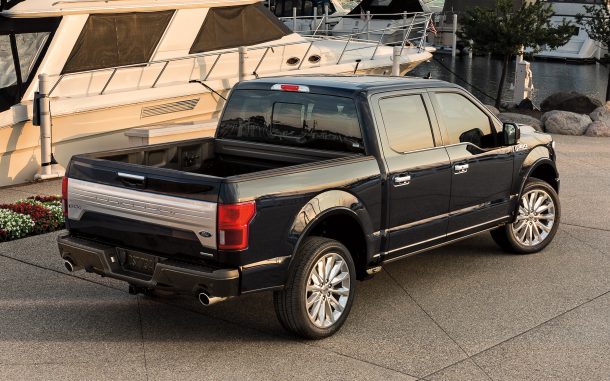Ford's F-Series - A Cross-border Comparo

In a market that shrunk 3.7 percent in July, Ford managed to escape the steep volume loss seen by some of its rivals. Still, the Ford brand saw a year-over-year U.S. sales drop of 2.7 percent last month, with its Lincoln division falling 11 percent. Over the first seven months of 2018, both brands posted a loss — 1.6 percent for Ford, 10.8 percent for Lincoln.
For the Blue Oval, at least, that’s in line with forecasters’ estimates of a slow industry decline in 2018. Lincoln’s another matter.
A peek at Ford’s sales figures shows why Dearborn hasn’t much love for cars. Minus the Fiesta, which you won’t have to worry about much longer, every other Ford passenger car model declined in both July and 2018 (with the niche exception of the GT). Try as they might, Ford’s truck sales couldn’t replace the lost passenger car volume, but they certainly dumped more cash in Ford coffers — on average — for each model sold.
It’s become a safe bet that no matter how Ford Motor Company fares at sales time, the F-Series will do just fine.
And that was certainly the case in July. As car sales across both brands shrunk by 27.7 percent, sales of Ford trucks rose 10.2 percent, led by a 2.1 percent increase in sales of the world’s strongest-selling truck line: the F-Series. Year to date, F-Series sales are up 4.6 percent, with July being the 15th consecutive month of year-over-year sales gains.
No other vehicle comes close to the F-Series’ volume, certainly not in the FoMoCo stable, though it’s worth mentioning that the Transit commercial van posted a 190.9 percent year-over-year increase in July.
With less overall volume, Ford’s Canadian sales are naturally more variable than in the United States. F-Series sales declined by 100 units north of the border — a statistically insignificant amount. More concerning for Ford Canada, however, is the model line’s 6.7 percent loss over the first seven months of 2018.
You see, despite their high taxes and gears-grinding pump prices, Canadians love their trucks, and they especially love their Ford trucks.
In the U.S., passengers cars accounted for 20.3 percent of the Ford brand’s YTD volume. In Canada, that share amounts to 11.9 percent. Over 88 percent of Blue Oval vehicles sold north of the border are crossovers, SUVs, vans, or pickups, and sales of just the F-Series line made up 48.3 percent of the brand’s volume in 2018.
In the U.S., the F-Series’ share of Ford’s sales this year amounts to 36.9 percent — a huge number, for sure, but nothing like in Canada. It’ll be very interesting to see how the Ranger fares in both countries when that midsize pickup finally appears on the market.
[Image: Ford Motor Company]

More by Steph Willems
Latest Car Reviews
Read moreLatest Product Reviews
Read moreRecent Comments
- Probert They already have hybrids, but these won't ever be them as they are built on the modular E-GMP skateboard.
- Justin You guys still looking for that sportbak? I just saw one on the Facebook marketplace in Arizona
- 28-Cars-Later I cannot remember what happens now, but there are whiteblocks in this period which develop a "tick" like sound which indicates they are toast (maybe head gasket?). Ten or so years ago I looked at an '03 or '04 S60 (I forget why) and I brought my Volvo indy along to tell me if it was worth my time - it ticked and that's when I learned this. This XC90 is probably worth about $300 as it sits, not kidding, and it will cost you conservatively $2500 for an engine swap (all the ones I see on car-part.com have north of 130K miles starting at $1,100 and that's not including freight to a shop, shop labor, other internals to do such as timing belt while engine out etc).
- 28-Cars-Later Ford reported it lost $132,000 for each of its 10,000 electric vehicles sold in the first quarter of 2024, according to CNN. The sales were down 20 percent from the first quarter of 2023 and would “drag down earnings for the company overall.”The losses include “hundreds of millions being spent on research and development of the next generation of EVs for Ford. Those investments are years away from paying off.” [if they ever are recouped] Ford is the only major carmaker breaking out EV numbers by themselves. But other marques likely suffer similar losses. https://www.zerohedge.com/political/fords-120000-loss-vehicle-shows-california-ev-goals-are-impossible Given these facts, how did Tesla ever produce anything in volume let alone profit?
- AZFelix Let's forego all of this dilly-dallying with autonomous cars and cut right to the chase and the only real solution.



































Comments
Join the conversation
Lincoln has assumed the position of Mercury: a tarted up Ford for people of questionable taste. Lincoln deathwatch is just as relevant as Buick deathwatch. Ford would be smart to just drop Lincoln and stop wasting money to chase a market that eschews it. Buick and Lincoln are your father's OLDsmobile.
Is there a reason why every article about sales figures on this site always mentions the Canadian market but never mentions the Mexican market? The population of Mexico is over three times that of Canada.